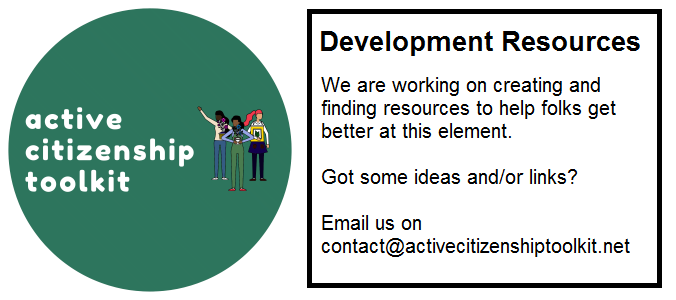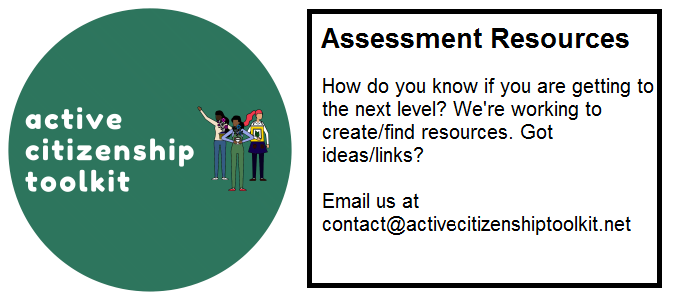Element Descriptor
Following any decision, event, project, initiative or action, this is a process to reflect and evaluate, what went well, what did not, and what could be improved will help in future decision-making and action-taking. It should help the group adapt and learn in an iterative manner for the future. This should help long-term thinking and help create a more resilient group. If you don’t postmortem, well, you risk not learning, or learning slowly, and failing to keep members/grow the group. The same mistakes being made demoralises and frustrates…
Level descriptors
| Novice | Practitioner | Expert | Ninja |
|---|---|---|---|
| Can fill in a post mortem or basic evaluation sheet and understands the significance of providing honest anonymous feedback to learn and adapt as an individual or group. Has the ability to self reflect on their own performance and detach their personal or historic opinions of other group members or external stakeholders from their contributions to a specific decision, event, project, initiative or action. Can create a post mortem or evaluation sheet from a template with help / supervision. | Can quickly fill in post mortem evaluations in an honest and efficient manner detaching any historical or personal issues. Understands the value of feedback and utilising to adapt future instances of similar situations. Can create appropriately-detailed feedback forms that can gather information from internal / external individuals in an anonymous and secure manner, which can be further analysed for trends and can prioritise constructive comments over personal gripes. | You are constantly learning and evolving about how to improve feedback being given and received by internal and external individuals through the post mortem process. You can organise & conduct anything from a quick evaluation about a call or meeting through to a detailed enquiry about the strategic direction of the group. You are fearless in being able to bring up ‘taboo’ or difficult topics and can conduct a detailed analysis of understanding how best to overcome these issues in a pragmatic manner. | You can post mortem better than a hardened victorian coroner. You quicker to provide and adapt to feedback and can handle something as small as a quick call at lightspeed through to a long detailed multistage government level enquiry that can take years – were you involved in Levenson? I wonder if your name will pop up to help out after all the Coronavirus dust has settled… |
Element Overview Essay
This is a draft. If something doesn’t make sense, or you see typos, or if you have further ideas, please email us on contact@activecitizenshiptoolkit.net
And I’m going to expand this to be post mortems of events, projects and processes more generally.
There are many causes why post mortems are not done or not done well.
One is it’s just not part of the activist cultures that I’ve seen
If you had to shine a spotlight on how effective you had been, whether you’d met your own goals , what the return on investment was, that becomes pretty analytic and often pretty depressing. And then becomes a space where people can fire off recriminations against each other about other things that didn’t didn’t get done. And this whole circular firing squad flicks off their safeties. Of course, postmortems don’t have to be like that.
NB Don’t collect feedback unless it is a) immediate b) anonymous c) framed to find out what was WRONG
The other thing is you don’t often see it in films or movies or books. And as I said, people haven’t experienced it.
Beyond that, though, there is this fear that a post mortem is like a Star Chamber, an Inquisition, and that people will be singled out and held up to humiliation and ridicule. And of course, you can do a post mortem that badly if you’re an asshole.
So other things to say about the causes of post mortems being done badly or not at all, is they’re done either too soon or too late. So there’s an immediate hotwash which captures lots of minor niggly tactical points.
And then that substitutes for the longer strategic view.
Or alternatively, there’s no hotwash. People forget all of those finer detail points. And the actual post mortem happens weeks later, when other things have come along and it all gets conflated and it seems pointless.
The consequences of not doing post mortems you’ll be happy to know the sections very short. You’re likely to learn nothing, or you’re likely to learn the wrong lessons. Or you’re likely to learn very, very slowly, much more slowly than you would otherwise would if you did systematic post mortems.
So the solutions are having systems in place so that you can learn from processes and products as you go, that you can capture some of the finer detail on paper or in writing. And when you are scheduling your meeting, your event, you are also in the planning stages, you have to be scheduling the post mortem, who is going to do it? When is it going to happen? How are they going to do it? How are they going to report their findings? And how will those findings be fed back into the group’s processes?
Now, this all sounds incredibly “bureaucratic”. But what’s the alternative? The alternative is it’s just a mishmash with various good ideas staying stuck inside people’s heads or in emails, or whatever. We’ve been doing it that way for a long time. How is that working out for us?
Development Resources

Assessment Resources

